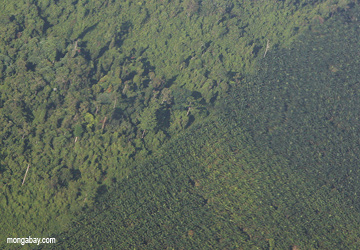Article on Biodiversity & Human Well-Being in Climate Forest Governance

Biolaw readers may be interested in the article Global Climate Governance to Enhance Biodiversity & Well-Being: Integrating Non-StateNetworks and Public International Law in Tropical Forests (forthcoming in 41 Environmental Law, 2011), which is available for free download here.
Here is the abstract:
Environmental governance frequently represents a leading edge of global regulation. The climate regime even continues to create new modes of regulation despite a negotiation impasse. These new initiatives, like existing legal approaches to environmental challenges, too often embrace a fragmented view of issue areas that fails to reflect fundamental connections between the objects of regulation. The shortcomings of a state-driven international issue-by-issue approach to global environmental governance have long been obvious in some areas (such as tropical forests), and are becoming ever clearer in others (most notably climate change). Therefore, private networks play an increasingly important role in global environmental governance, as illustrated most directly by forest certification that was developed to fill a gap left by negotiation failures of the 1990s. These prior failures also laid the groundwork for tropical forests to become an object of climate regime regulation, giving rise to one of the most promising and innovative programs for generating a much-needed new approach to global environmental governance more broadly. The reduced emissions from deforestation and degradation (REDD) program holds out the promise of not only reducing greenhouse gas emissions in the forest sector, but also promoting public goods associated with biodiversity and human well-being. Nonetheless, REDD remains incompletely formed and fragile. An over-emphasis on mitigation, which seems likely given REDD’s climate regime origins, may prove self-limiting or even self-defeating for the program. In response to this concern, and the need for greater recognition of issue-linkages in designing global environmental regulation generally, this article proposes a novel hybrid public-private governance approach to REDD that can encourage maximum emissions reductions while also effectively promoting a broad array of benefits for biodiversity and human well-being. In so doing, the article also offers an innovative and generalizable model for combining private market finance and public funding to increase the coherence and effectiveness of global environmental regulation.
Here is the abstract:
Environmental governance frequently represents a leading edge of global regulation. The climate regime even continues to create new modes of regulation despite a negotiation impasse. These new initiatives, like existing legal approaches to environmental challenges, too often embrace a fragmented view of issue areas that fails to reflect fundamental connections between the objects of regulation. The shortcomings of a state-driven international issue-by-issue approach to global environmental governance have long been obvious in some areas (such as tropical forests), and are becoming ever clearer in others (most notably climate change). Therefore, private networks play an increasingly important role in global environmental governance, as illustrated most directly by forest certification that was developed to fill a gap left by negotiation failures of the 1990s. These prior failures also laid the groundwork for tropical forests to become an object of climate regime regulation, giving rise to one of the most promising and innovative programs for generating a much-needed new approach to global environmental governance more broadly. The reduced emissions from deforestation and degradation (REDD) program holds out the promise of not only reducing greenhouse gas emissions in the forest sector, but also promoting public goods associated with biodiversity and human well-being. Nonetheless, REDD remains incompletely formed and fragile. An over-emphasis on mitigation, which seems likely given REDD’s climate regime origins, may prove self-limiting or even self-defeating for the program. In response to this concern, and the need for greater recognition of issue-linkages in designing global environmental regulation generally, this article proposes a novel hybrid public-private governance approach to REDD that can encourage maximum emissions reductions while also effectively promoting a broad array of benefits for biodiversity and human well-being. In so doing, the article also offers an innovative and generalizable model for combining private market finance and public funding to increase the coherence and effectiveness of global environmental regulation.
Labels: EAL












0 Comments:
Post a Comment
<< Home